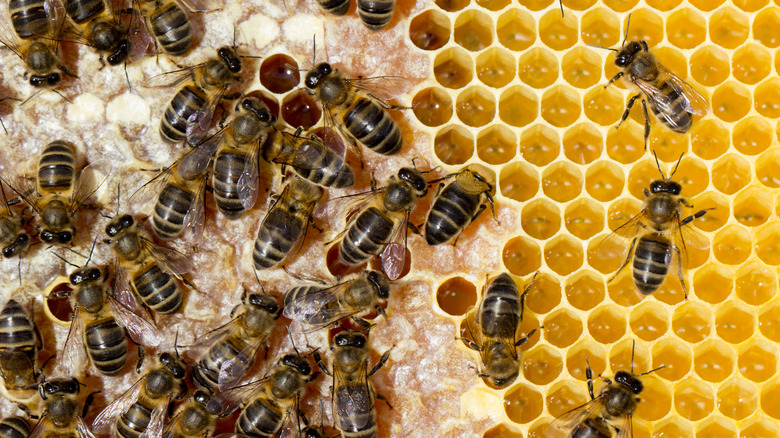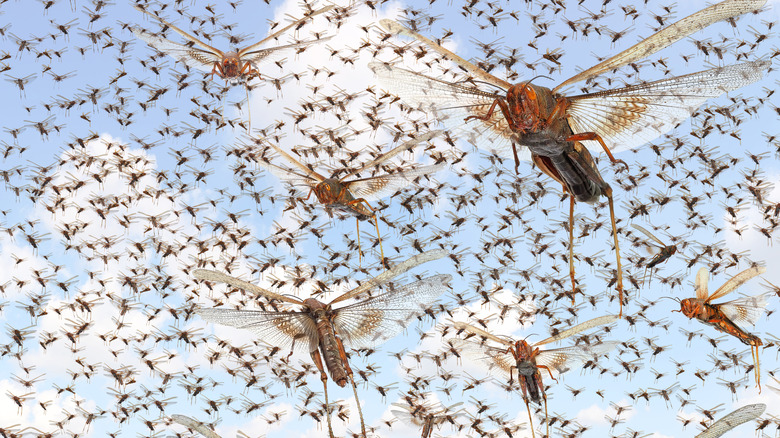The Science Behind Why People Have A Fear Of Bugs
Got a fear of bugs? You're not alone. Entomophobia (the fear of insects) and arachnophobia (fear of spiders) are both common phobias among human beings, but even more common is a general wariness around bugs. Though we share the planet with some 10 quintillion insects (via Smithsonian), many people feel an almost instinctual anxiety around bugs.
According to 2020 post by Mental Floss, some scientists have investigated why so many of us have a gut reaction of fear or revulsion at the sight of these tiny creatures. Even though they're usually easy to swat, insects sometimes bring the threat of personal harm or home infestation. And some pests can really pack a punch, like the fleas that caused the Black Death in the 14th century, or the malaria-carrying mosquitoes that have terrorized millions of people across history. But simply seeing a cockroach dart out from under the couch might not necessarily trigger thoughts of plagues. Science may explain whether our fear of these skittering critters goes deeper.
Is there a 'fear bugs' gene?
Mental Floss spoke with entomologist Dr. Jeffrey Lockwood, who wrote the book "The Infested Mind: Why Humans Fear, Loathe, and Love Insects," to learn whether anxiety around insects is connected to human evolution. The short answer is that there's no gene that tells us to fear bugs. However, as Dr. Lockwood says, "There is evidence that we are particularly prone to associate certain stimuli with danger in the form of 'prepared learning.'" In other words, someone might learn to be cautious around a bee hive because their parents or friends taught them to be (or even survived an encounter with some angry bees).
Dr. Lockwood compares our "prepared learning" about insects with how we learn language. Language isn't genetic, but it is passed down. Generational knowledge prepares some people to be on guard around spiders, for instance, due to certain species' deadly poison. Avoiding foods that have been contaminated by cockroaches or maggots is a survival tactic that may have benefited our more careful ancestors.
Mixing up fear and disgust
Most bugs are harmless to human beings, and yet so many people recoil as soon as they spot one indoors or outside. But is that knee-jerk reaction to a fly landing on our arms based in fear or disgust? It might be both.
The Cut explored the relationship between these two feelings, remarking that, "We aren't just afraid of insects the same way we would fear other dangerous animals, like lions or bears. There are plenty of species that we'd run from if we saw them in the wild, but that we have no qualms about making into cuddly animated characters." For many people, bugs aren't just threatening, but disgusting, too. Psychologists have found that human fear is wrapped up in the disgust response, often as a protective trait. Moldy bread or a rotting carcass would gross out most people, keeping them from eating spoiled food or contracting a disease. An infestation of insects could indicate something is just as dangerous, but even in isolation, many people are disgusted by any given insect's eyes, legs, movement, antennae — you name it.
Dr. Jeffrey Lockwood has said that insects' intrusive nature have come to symbolize uncleanliness and a breach of safety. Even as a scientist, he's been overwhelmed and terrified by a swarm of grasshoppers. "Their numbers and behavior and their overwhelming capacity conspired to generate a panic attack," he said. "I'd never had such a reaction to insects, or to grasshoppers in particular, until that time."
Sometimes, it's just social
As The Cut wrote, "There's a reason we don't have bugs gracing the covers of our cereal boxes or appearing as lovable heroes in our kids' cartoons." Our disgust and fear of insects has fed into wider culture, creating a world of media and entertainment in which most bugs are considered threatening, grotesque, alien and even predators of humans. Over the past few decades, NBC's "Fear Factor" submerged contestants in vats of creepy crawlies, "Starship Troopers" pitted humanity against a race of giant insects, and David Cronenberg's "The Fly" transformed a 1950s B-movie into a body horror film centered on a teleportation accident (involving, yes, a fly, as well as Jeff Goldblum). Popular culture both feeds on and informs our distaste for the insect.
But the humble bug may still have a chance at redemption. Peter Parker, bitten by a radioactive spider, has endured for years in comics and film as Spider-Man. The French children's show "Miraculous: Tales of Ladybug & Cat Noir" also features a bug-based superhero. And the animated films "A Bug's Life" and "Bee Movie" attempted to depict insects as tired little workers scraping by each day — just like us.



